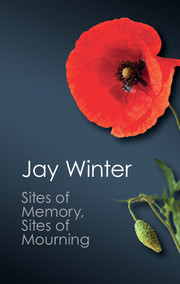Book contents
- Frontmatter
- Contents
- List of illustrations
- Acknowledgements
- List of abbreviations
- Introduction
- I Catastrophe and consolation
- 1 Homecomings: the return of the dead
- 2 Communities in mourning
- 3 Spiritualism and the ‘Lost Generation’
- 4 War memorials and the mourning process
- II Cultural codes and languages of mourning
- Notes
- Bibliography
- Index
3 - Spiritualism and the ‘Lost Generation’
Published online by Cambridge University Press: 05 June 2014
- Frontmatter
- Contents
- List of illustrations
- Acknowledgements
- List of abbreviations
- Introduction
- I Catastrophe and consolation
- 1 Homecomings: the return of the dead
- 2 Communities in mourning
- 3 Spiritualism and the ‘Lost Generation’
- 4 War memorials and the mourning process
- II Cultural codes and languages of mourning
- Notes
- Bibliography
- Index
Summary
Introduction
The Great War, the most ‘modern’ of wars, triggered an avalanche of the ‘unmodern’. One salient instance of this apparent contradiction is the wartime growth in spiritualism. Here was one of the most disturbing and powerful means by which the living ‘saw’ the dead of the Great War, and used their ‘return’ to help survivors cope with their loss and their trauma.
In this context, the study of religious beliefs and practices is of real significance. This chapter examines one facet of this issue. We have valuable studies of religious institutions and religious dissent during the war. But a subject until recently largely unexplored is the effect of the war on the religious imagination, broadly defined, both within and outside the confines of the traditional churches. Here it may be useful to highlight the history of the somewhat unconventional, but by no means insignificant, community of European spiritualists, whose number grew during the war and because of the war, and whose beliefs and practices carried much of the Victorian temperament into the war period and beyond. Continuity, not transformation; reiteration, not alteration, are the key features of the wartime and postwar history of what may be described as the spiritualist communion.
Spiritualism may be defined in two ways. First, secular spiritualism encompasses the views of those who explore the supposed existence of human personality after death and the possibility of communication with the dead.
- Type
- Chapter
- Information
- Sites of Memory, Sites of MourningThe Great War in European Cultural History, pp. 54 - 77Publisher: Cambridge University PressPrint publication year: 2014



